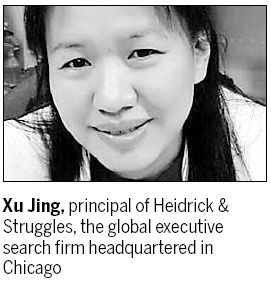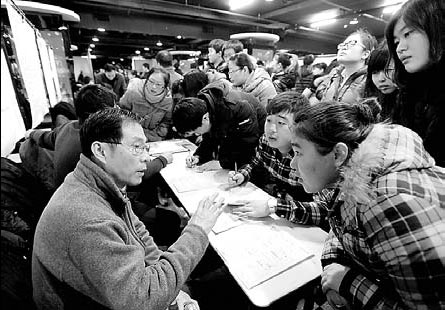Human resources managers face colossal task
Updated: 2013-01-18 07:43
(China Daily)
|
||||||||
|
A booth at a large-scale job fair in Shenyang, Liaoning on Jan 12. The event was joined by 168 enterprises providing some 3,000 vacancies. Xinhua |
Human Resources | ED Zhang
Pressure is piling up for human resources managers.
As the whole country is talking about the change of the economic growth model - from an old model that relied primarily on cheap labor to a new one based on quality manufacturing, diversified services and domestic consumption - who are the people who will make the change happen?
Where will we find those would-be innovators at the national level, industry level, as well as corporate level?
There is quite a gap between demand and supply in the talent market. And it's not hard to understand why, said Xu Jing, principal of Heidrick & Struggles, the global executive search firm headquartered in Chicago.
"It takes time to build a large pool of talent. It's not like pushing a button. It takes a very long time for a society to develop an adequate stock of knowledge and experience for the expected innovation," she said in an interview with China Daily.
By contrast, China's reform and opening-up policy was launched no more than 30 years ago. "How much managerial expertise could the country have accumulated in just over two decades?"
There was always some unsatisfied demand for managerial talent - even during the high-growth years under the old economic model. Between now and then, the only difference is that the shortage of talent got worse.
"In the past, there were still a few. Now there seems to be none, as some companies say," Xu said.
And the shortage comes at a time when an increasing number of Chinese companies are trying to expand investment and operations overseas. What can the corporate leaders do?
Xu believes that first, of course, they have to "import talent" - or look for skilled employees outside the company, and even outside the country.
Then, they have to change their way of managing people, and adopt an "open attitude", which means working with teams comprising people from different backgrounds.

The companies that have done M&A deals abroad should take a good look at their experience and learn their lessons.
Also, they have to invest seriously in training programs designed for their future echelon of C-level executives, by using internal and high-quality external resources, including top-level business schools.
And they also have to know where to find the right talent.
"The fact is," Xu said, "there are people out there who can help - so long as you know where they are and in what ways their expertise can be best utilized."
For large companies, such as State-owned enterprises, the key is for the leaders to learn from past experience, Xu said.
"Chinese companies have made too many overseas M&A deals in recent years that are yet to realize their intended value," she added.
Part of the value is lost when the Chinese company fails, due to confusing internal policies, to retain and integrate the human resources in the targeted foreign company. The deal is less valuable once the human resources are lost, and along with them the company's capability to serve the external market.
Outstanding example
Fortunately, there are also a few exceptions, which developed out of the corporate leaders' persistent efforts to learn from the market and self-reflection abilities.
One example is the BlueStar Group, part of China National Chemical Corp, or ChemChina, Xu said. The company has done so many overseas takeovers that it has developed an operational team familiar with the due processes and able to work where the business is about to expand.
"From the way the company's top leaders talk, you cannot see any difference between their understanding of the world and those of their counterparts from large Western companies," Xu noted.
Another example, by contrast, is the learning experience gathered from the long-time mixing of Chinese and foreign executives in one office, as seen in Lenovo Group Ltd, the Chinese computer maker that took over IBM's personal computer operations in 2004.
Through a painful transition, which also straddled the world's worst financial crisis in post-war history, the company has also managed to develop an operational team capable of competing in an international environment.
"From these cases, what we can see is that although China is a latecomer to the game of building global companies, the learning potential of Chinese managers is generally by no means poor," Xu said.
From time to time, the biggest problems are with the bosses, Xu pointed out. There are corporate leaders who are not quite aware of what kind of teamwork they really need, especially strong-minded bosses of private companies.
They don't realize what kind of people make a mutually supportive and enabling team until they go through a trial-and-error process.
"This is an area where successes are exceptional. Failures are common. And many companies show the tendency to underestimate the difficulties," she said.
Incompatible cultures do not create synergies. A self-made entrepreneur with lots of hands-on experience does not need someone good at all-round leadership, but someone more focused and resourceful in implementation, Xu said.
For private companies, it is important for entrepreneurs and the top managers they employ to define their roles clearly. "And so much the better if the top manager has the skills to manage the entrepreneur," Xu said.
The Alibaba Group, a private company and China's largest e-commerce operator, was cited as an example of the synergy from a visionary founder and an effective manager of everyday operations.
With their different backgrounds and skill sets, members of an executive team have to work with one another in a productive way to achieve the best performance. This is the key, Xu stressed, to a company trying to manage its inevitable transition from being local and not so large, to being very large and competitive globally.
So long as corporate leaders have a clear understanding of what skill sets they need, they can start hunting for them globally.
"And that way they can find much larger supplies - from many international companies and also some Chinese companies," she said.
In the meantime, there are plenty of education resources that can be tapped. There are Chinese companies that send, on an annual basis, young hopefuls to quality management schools around the world.
Domestic universities, including their business education sections, are improving and getting better places in international rankings.
The demand for high-caliber managers may be huge. But after more than two decades of intense reform and development, the country has been building up its talent pool.
"China is not starting from scratch after all," Xu said.
Contact the writer at edzhang@chinadaily.com.cn
(China Daily 01/18/2013 page17)

 In Photos: 7.0-magnitude quake hits Sichuan
In Photos: 7.0-magnitude quake hits Sichuan
 Li Na on Time cover, makes influential 100 list
Li Na on Time cover, makes influential 100 list
 FBI releases photos of 2 Boston bombings suspects
FBI releases photos of 2 Boston bombings suspects
 World's wackiest hairstyles
World's wackiest hairstyles
 Sandstorms strike Northwest China
Sandstorms strike Northwest China
 Never-seen photos of Madonna on display
Never-seen photos of Madonna on display
 H7N9 outbreak linked to waterfowl migration
H7N9 outbreak linked to waterfowl migration
 Dozens feared dead in Texas plant blast
Dozens feared dead in Texas plant blast
Most Viewed
Editor's Picks

|

|

|

|

|

|
Today's Top News
Live report: 7.0-magnitude quake hits Sichuan, heavy casualties feared
Boston suspect cornered on boat
Cross-talk artist helps to spread the word
'Green' awareness levels drop in Beijing
Palace Museum spruces up
First couple on Time's list of most influential
H7N9 flu transmission studied
Trading channels 'need to broaden'
US Weekly

|

|








